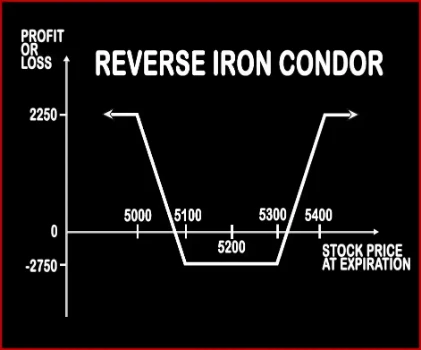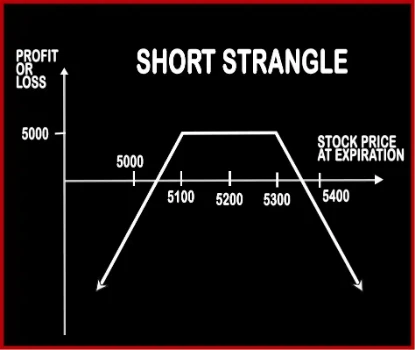Compare Strategies
| REVERSE IRON CONDOR | SHORT STRANGLE | |
|---|---|---|

|

|
|
| About Strategy |
Reverse Iron Condor Option StrategyReverse Iron Condor as the name suggests is the opposite of Iron Condors. In Reverse Iron Condor, a trader is bullish about volatility and expects the market to make a significant move in the near future in either direction. Here a trader will buy 1 OTM Call Option, sell 1 Deep OTM Call Option, buy 1 OTM Put Option, sell 1 Deep OTM Put Option. This strategy also |
Short Strangle Option StrategyThis strategy is similar to Short Straddle; the only difference is of the strike prices at which the positions are built. Short Strangle involves selling of one OTM Call Option and selling of one OTM Put Option, of the same expiry date and same underlying asset. Here the probability of making profits is more as there is a spread between the two strike prices, and if .. |
REVERSE IRON CONDOR Vs SHORT STRANGLE - Details
| REVERSE IRON CONDOR | SHORT STRANGLE | |
|---|---|---|
| Market View | Neutral | Neutral |
| Type (CE/PE) | CE (Call Option) + PE (Put Option) | CE (Call Option) + PE (Put Option) |
| Number Of Positions | 4 | 2 |
| Strategy Level | Advance | Advance |
| Reward Profile | Limited | Limited |
| Risk Profile | Limited | Unlimited |
| Breakeven Point | Upper Breakeven Point = Strike Price of Long Call + Net Premium Paid, Lower Breakeven Point = Strike Price of Long Put - Net Premium Paid | Lower Break-even = Strike Price of Put - Net Premium, Upper Break-even = Strike Price of Call+ Net Premium |
REVERSE IRON CONDOR Vs SHORT STRANGLE - When & How to use ?
| REVERSE IRON CONDOR | SHORT STRANGLE | |
|---|---|---|
| Market View | Neutral | Neutral |
| When to use? | In Reverse Iron Condor, a trader is bullish about volatility and expects the market to make a significant move in the near future in either direction | This strategy is perfect in a neutral market scenario when the underlying is expected to be less volatile. |
| Action | Buy 1 OTM Put, Sell 1 OTM Put (Lower Strike), Buy 1 OTM Call, Sell 1 OTM Call (Higher Strike) | Sell OTM Call, Sell OTM Put |
| Breakeven Point | Upper Breakeven Point = Strike Price of Long Call + Net Premium Paid, Lower Breakeven Point = Strike Price of Long Put - Net Premium Paid | Lower Break-even = Strike Price of Put - Net Premium, Upper Break-even = Strike Price of Call+ Net Premium |
REVERSE IRON CONDOR Vs SHORT STRANGLE - Risk & Reward
| REVERSE IRON CONDOR | SHORT STRANGLE | |
|---|---|---|
| Maximum Profit Scenario | Strike Price of Short Call (or Long Put) - Strike Price of Long Call (or Short Put) - Net Premium Paid - Commissions Paid | Maximum Profit = Net Premium Received |
| Maximum Loss Scenario | Net Premium Paid + Commissions Paid | Loss = Price of Underlying - Strike Price of Short Call - Net Premium Received |
| Risk | Limited | Unlimited |
| Reward | Limited | Limited |
REVERSE IRON CONDOR Vs SHORT STRANGLE - Strategy Pros & Cons
| REVERSE IRON CONDOR | SHORT STRANGLE | |
|---|---|---|
| Similar Strategies | Short Condor | Short Straddle, Long Strangle |
| Disadvantage | • Potential loss is higher than gain. • Limited profit. | • Unlimited loss is associated with this strategy, not recommended for beginners. • Limited reward amount. |
| Advantages | • Able to profit whether stocks move in either direction up or down. • This strategy can be used by option traders who cannot use credit spreads. • Predictable maximum loss and profits. | • Higher chance of profitability due to selling of OTM options. • Advantage from double time decay and a contraction in volatility. • Traders can book profit when underlying asset stays within a tight trading range. |